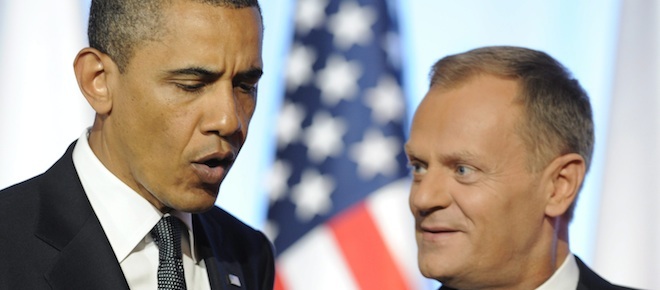Obama’s Polish blunder
The outrage in Poland over Obama’s passing remark is hard to exaggerate
U.S. President Barack Obama and Polish Prime Minister Donald Tusk, right,speak after a press conference following their meeting at the Prime Minister’s Chancellery, in Warsaw, Poland, Saturday, May 28, 2011, on the second day of Obama’s visit to Poland. (AP Photo/Alik Keplicz)
Share

Yesterday in a White House ceremony honouring a Polish war hero, Barack Obama used the phrase “Polish death camp.” There’s video here.
The outrage in Poland over Obama’s passing remark is hard to exaggerate. At this hour, the Gazeta Wyborcza website is host to at least a half-dozen stories. Poland’s prime minister has released a lengthy statement:
“The words uttered yesterday by the President of the United States Barack Obama concerning “Polish death camps” touched all Poles. We always react in the same way when ignorance, lack of knowledge, bad intentions lead to such a distortion of history, so painful for us here in Poland, in a country which suffered like no other in Europe during World War II.”
Two non-Poles with close ties to the country have expressed the despair most Poles feel over an offense most people outside Poland would not even notice. Edward Lucas, international editor of The Economist, has a blog post here. David Frum, whose close friend Anne Applebaum is married to the Polish foreign minister, excoriates Obama here.
By now many Canadian readers will be perfectly baffled over all the fuss. But three years ago, we at Maclean’s made the same mistake Obama did yesterday, so perhaps I can explain.
In 2009 a Maclean’s reporter, speaking about John Demjanjuk’s trial, made passing reference to “Polish death camps.” The Polish embassy went into crisis mode. I wound up devoting my weekly column to the matter a couple of weeks later. Here’s that column. The short version: to Poles, the proper phrase is “Nazi death camps.” Their location was not Poles’ choice, and the camps’ first prisoners were Poles. The penalty for protecting a Jew was death for the protector’s entire family. An excerpt from that 2009 column:
‘If you go to the Polish Foreign Ministry’s website today and pull down the menu under the “Foreign Policy” tab, the first issue listed—ahead of “Asia and Pacific Region” and Poland’s “Eastern Partnership” with the countries of the former Soviet Union—is “Against ‘Polish Camps.’ ” Follow that link and you’ll find a list of erroneous references to the offending phrase in the news media of 24 different countries; more than a dozen corrections and press-council judgments sought by Polish authorities in several of those countries; and excerpts from the 2005 annual address to Poland’s parliament by the country’s then-foreign minister, Adam Rotfeld. “I believe the time is ripe, 60 years after the end of the war, for the elementary truth about what really happened in occupied Poland” to come to light, Rotfeld told his colleagues. “It was in Polish territories that the Germans created the largest camps of annihilation, where—alongside the Jewish people—Poles and members of other European nations were murdered on a mass scale.”
‘In that context, Rotfeld said, “use of the term ‘Polish death camps’?.?.?.?not only conceals the truth about the perpetrators of that crime, but slanders our nation, which was the first victim of the criminal practices of Nazi Germany.”’
There is a broader political context for the latest uproar over Obama. The populations of Central and Eastern Europe have worried, for about as long as he’s been president, that he has no feel for the region. I wrote about that here.
I’m wary writing about this “Polish camp” business. Experience shows that readers of Polish background will often assume that no innocent mistake is possible: that of course everyone, from a magazine reporter to the President of the United States, has thought this through, understands Poland’s innocence, and has decided to smear and denigrate the country anyway, as part of some vast anti-Polish conspiracy. Readers who don’t think much about Poland sometimes assume the whole fuss is wild over-reaction at best, or at worst a culpable attempt by Polish authorities to escape the judgment of history. The Economist‘s Lucas urged Polish readers last night on Twitter to stay calm. Frum, whose wife Danielle Crittendon will soon release a Polish cookbook co-written with Applebaum, seems taken aback this morning as he realizes that it’s not obvious to his Twitter followers what Obama did wrong.
Of course the President wasn’t seeking to offend. But I think I’ve come to understand why he offended anyway. As I wrote at the end of that 2009 column, “Imagine a consummate evil being committed in your home by invaders. You would wish the world knew it wasn’t your choice. You wouldn’t ever stop wishing it.”